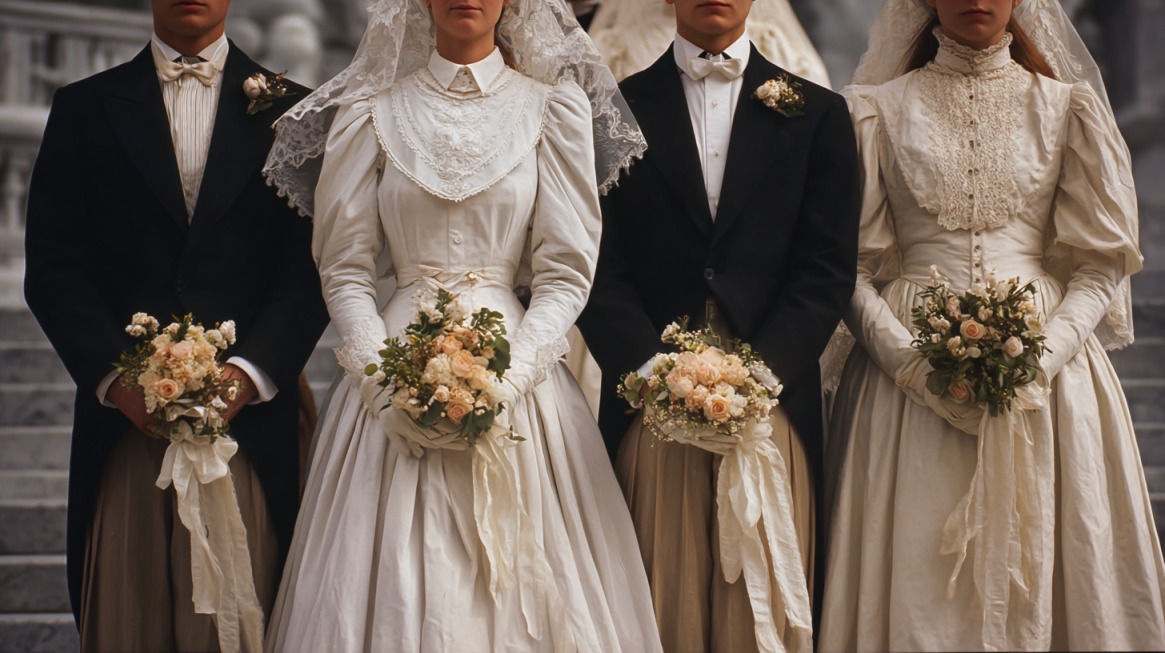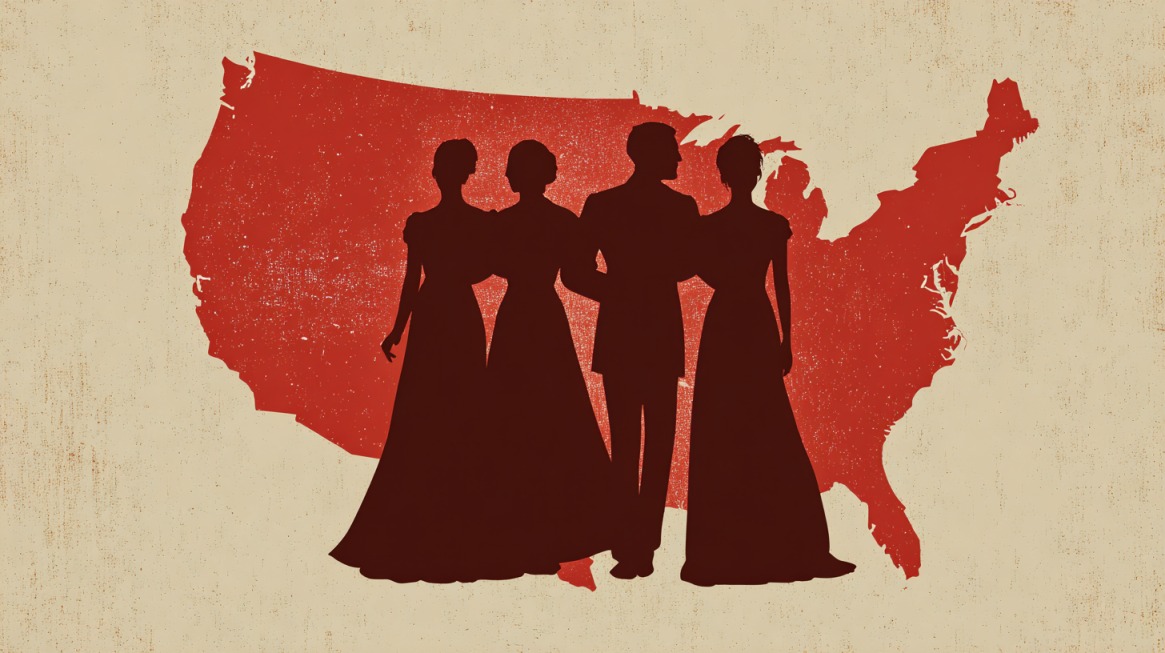Polygamy refers to being married to more than one spouse at the same time.
Within that, polygyny involves one man with multiple wives, while polyandry refers to one woman with multiple husbands.
Bigamy, by contrast, deals with entering into a second marriage while a first remains legally valid.
In many cultures and religions, plural marriages hold symbolic or spiritual importance, though laws in the United States approach the matter differently.
State Laws on Polygamy
State-level treatment of polygamy reveals a consistent rejection of plural marriage across all fifty jurisdictions.
Legislatures define these acts as violations of public order, tying their reasoning to historical traditions of monogamous marriage and concerns about fraud, coercion, or social instability.
While wording differs between states, the core message remains the same: plural marriages are void and participants can face prosecution.

Criminalization Across States
Every state criminalizes both polygamy and bigamy. Legislators often merge or overlap the definitions, making the statutes broad enough to capture multiple forms of plural unions.
Courts also make clear that marriages involving more than two parties lack recognition in civil law, leaving participants outside legal protection.
- California Penal Code § 281: Defines and criminalizes bigamy.
- Utah Code Ann. § 76-7-101: Prohibits unlawful cohabitation and polygamy.
- Idaho, Arizona, and Oklahoma laws: Contain nearly identical provisions declaring plural marriages void.
By relying on such statutes, states ensure that plural marriage remains a prohibited act regardless of cultural or religious justification.
Criminal Penalties
Legal consequences extend beyond invalidating the marriage itself. Prosecutors often bring felony charges when individuals enter into plural marriages.
Punishments include both incarceration and financial penalties.
- Prison sentences: Ranging from one year to several years, depending on state law.
- Fines: California imposes fines of up to $10,000.
- Jail terms: One year in some jurisdictions as an alternative to fines.
Prosecution frequently targets additional crimes that emerge in polygamous communities. Examples include:
- Welfare fraud
- Child abuse
- Incest
- Statutory rape

Such charges are often easier to prove, providing prosecutors with a more effective strategy than attempting to establish polygamy alone.
Enforcement Challenges
Enforcement of polygamy laws presents practical and political difficulties. Historical raids and high-profile prosecutions shaped public opinion, often creating sympathy for targeted communities.
Authorities today rarely prioritize direct polygamy charges, instead focusing on crimes with more accessible evidence.
- Lack of documentation: Many plural unions are not formally recorded.
- Reluctant witnesses: Victims or spouses may refuse to testify due to loyalty or fear.
- Local leniency: Some officials show reluctance to disrupt families or challenge community norms.
The Short Creek Raid of 1953, involving the arrest of hundreds in Arizona and Utah, remains a symbolic event. Public outrage over the handling of families led to greater caution by law enforcement in subsequent decades.
Family Law Implications
Family law further highlights how polygamy lacks recognition in civil courts. Legal systems in every state adhere strictly to two-party marriage structures. Any attempt to register multiple marriages results in annulment rather than divorce, as the relationship is considered void from inception.
- Spousal rights: Absent unless established through private contracts.
- Property division: Limited legal protections in disputes.
- Child custody: Courts prioritize child welfare, complicating custody rulings where multiple spouses exist.
- Inheritance issues: Plural spouses often excluded from legal inheritance unless specified in a will.
Participants in plural marriages often face legal uncertainty in property and custody disputes, creating instability for both adults and children involved.
Constitutional and Civil Rights Arguments

Debates surrounding polygamy often extend far beyond criminal codes and family law, reaching into constitutional theory.
Supporters of plural marriage consistently argue that existing prohibitions collide with guarantees of religious liberty and equal protection, while courts respond by highlighting the state’s responsibility to regulate marriage for the broader public interest.
Judges tend to frame polygamy as a matter of conduct rather than belief, distinguishing it from protected forms of religious or personal expression.
While plural unions lack recognition under U.S. law, litigants confronting criminal charges might also consider alternate plea strategies, such as an Alford or a no-contest plea, to mitigate risk.
Religious Freedom (First Amendment)
Advocates for plural marriage rely heavily on the First Amendment, which guarantees free exercise of religion. Many religious groups claim that plural unions reflect sacred traditions and form part of their spiritual obligations.
Courts, however, have consistently drawn a line between protected belief and regulated conduct. A central case in this area, Reynolds v. United States (1878), involved a Mormon leader prosecuted under federal anti-bigamy laws.
The Supreme Court ruled that while individuals remain free to believe in plural marriage, the state has the authority to prohibit the actual practice. That decision set a precedent still used today:
Religious motivation does not exempt individuals from general criminal laws.
Legal reasoning rests on the idea that religious freedom cannot be used as a shield for practices deemed harmful to society.
Equal Protection (Fourteenth Amendment)
The Fourteenth Amendment provides another battleground for polygamy debates. Advocates highlight that equal protection extends to personal liberties, including the right to marry.
The Supreme Court’s decision in Obergefell v. Hodges (2015), which legalized same-sex marriage nationwide, has become a cornerstone of these arguments. By declaring marriage a fundamental right, Obergefell gave reformers new ground to challenge polygamy bans as inconsistent with evolving definitions of marital freedom.
Supporters of reform argue that if the Constitution protects the right of same-sex couples to marry, it should also safeguard the right of consenting adults to enter plural marriages. They contend that plural unions represent another form of personal liberty, deserving the same recognition.
Opponents counter with concerns about administrative chaos, social order, and legal instability. Marriage laws are built around two-person structures for purposes such as inheritance, custody, tax benefits, and healthcare decision-making.
Expanding that framework, they argue, would strain existing systems and potentially disadvantage vulnerable parties within plural unions.
Even within Obergefell, dissenting justices warned that the Court’s reasoning could logically extend to polygamy, suggesting that future litigants might attempt to use the ruling as precedent.
While courts have so far resisted such challenges, the debate continues among scholars, activists, and lawmakers.
Immigration Consequences
Immigration law reflects another dimension of constitutional and civil rights debates, particularly in how the United States balances personal liberty with public policy.
Federal authorities treat polygamy not only as a disqualifying factor for citizenship but also as incompatible with the nation’s legal order.
Both legally recognized plural marriages abroad and informal spiritual unions fall under scrutiny.
- Denial of citizenship applications: Any applicant engaged in plural marriage faces automatic disqualification.
- Revocation of status: Permanent residents admitting to polygamy risk losing their legal residency.
- Rejection of family sponsorship: A person cannot use a polygamous spouse as a basis for visa eligibility.
Officials stress that polygamy conflicts with the principles of American civil law, which recognize only monogamous marriage. By aligning immigration policy with domestic family law, the government ensures consistency across federal enforcement.

The Bottom Line
Polygamy remains illegal in every U.S. state despite its cultural and religious significance for certain groups.
Criminal statutes exist nationwide, though enforcement often shifts toward related crimes due to practical challenges.
Courts continue to reject constitutional claims under both religious freedom and equal protection arguments. Immigration policy adds another layer of prohibition, denying entry or citizenship to those engaged in plural marriage.
While debates persist, the current law upholds monogamy as the sole recognized structure of marriage in the United States, leaving polygamy outside the boundaries of legality.

